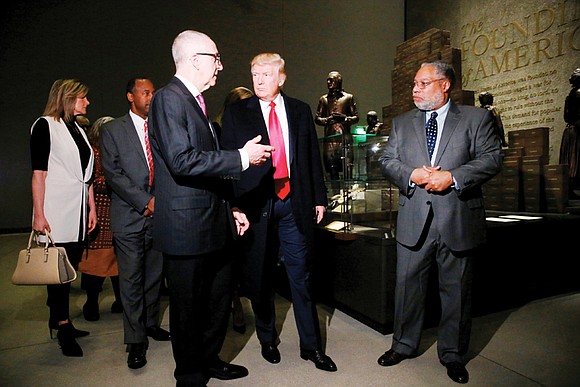Trump decries anti-Semitism, racism after D.C. museum visit
Free Press wire reports | 2/24/2017, 12:32 p.m.

Free Press wire reports
WASHINGTON
President Trump called anti-Semitic violence “horrible” and vowed on Tuesday to take steps to counter extremism.
His remarks, made following a visit to the Smithsonian’s National Museum of African American History and Culture, comes on the heels of wide criticism that the White House had not clearly denounced vandalism and threats targeting Jewish institutions.
Hours before President Trump’s remarks, Democrat Hillary Clinton called on her former presidential rival to speak out against anti-Semitic acts after more than 170 Jewish graves were found toppled at a cemetery in University City, Mo., and a fourth wave of bomb threats against Jewish community centers in several states.
“The anti-Semitic threats targeting our Jewish community at community centers are horrible and are painful and a very sad reminder of the work that still must be done to root out hate and prejudice and evil,” the president said.
He called the tour a “meaningful reminder of why we have to fight bigotry, intolerance and hatred in all of its very ugly forms.”
The remarks also appeared aimed at easing pressure on the Trump administration, which faces claims from opponents that it has failed to distance itself from extremist ideology and has emboldened right wing groups. Indeed, his presidential campaign and administration have used anti-Semitic, anti-Muslim, anti-immigrant and racist tropes and language, critics claim.
The condemnation came too little, too late, Jewish groups said.
“The president’s sudden acknowledgement is a Band-Aid on the cancer of anti-Semitism that has infected his own administration,” Steven Goldstein, executive director of the Anne Frank Center for Mutual Respect, said in a statement later Tuesday.
“President Trump’s condemnation this morning of anti-Semitism is as welcome as it is overdue,” said Rabbi Jonah Dov Pesner, in a statement issued on behalf of the Reform Movement, the largest stream of American Judaism.
The statement criticized the president as “inexcusably silent as this trend of anti-Semitism has continued and arguably accelerated.”
In all, at least 69 incidents at 54 Jewish community centers in 27 states and one Canadian province have been reported, according to the JCC association.
Monday’s revelations about the Missouri cemetery desecration and more bomb threats against Jewish community centers drew a tweeted response from President Trump’s oldest daughter, Ivanka, a convert to Judaism, and elicited comments from a White House spokesman, neither of whom used the phrase “anti-Semitism” or mentioned Jews.
Ivanka Trump’s tweet: “America is a nation built on the principle of religious tolerance. We must protect our houses of worship & religious centers. #JCC”
Jonathan Greenblatt of the Anti-Defamation League then sent out his own tweet stating Jews need to urge President Trump to “step forward & share a plan” to stop anti-Semitic actions.
However, the president’s critics point to several actions by President Trump that they contend give tacit approval to hate groups. Among them:
• President Trump’s refusal to denounce prominent anti-Semites who endorsed him, including former KKK Grand Wizard David Duke and Richard Spencer, who has publicly proclaimed, “Heil Trump!”
• His use of Jewish stereotypes on the campaign trail, characterizing Jews as dealers and moneymakers, pulling the strings of government.
• A White House statement on International Holocaust Remembrance Day that made no reference to Jews or anti-Semitism.
• His appointment of Steve Bannon as one of his top aides. Mr. Bannon, who used to edit Breitbart News, has been accused of running anti-Semitic headlines and columns.
• President Trump’s failure last week to answer reporters’ questions about rising anti-Semitism. When a journalist from an Orthodox Jewish publication assured President Trump that he did not consider the president anti-Semitic, but wanted him to comment on recent anti-Semitic incidents around the country, President Trump called it an unfair question and told the reporter to sit down.
“I am the least anti-Semitic person you’ve ever seen,” President Trump said.
The president was accompanied on the Smithsonian tour by an entourage that included retired neurosurgeon Dr. Ben Carson, who has been nominated to lead the U.S. Department of Housing and Urban Development and who is featured in one of the museum’s exhibits.
Also joining the group were U.S. Sen. Tim Scott, a Republican from South Carolina and one of three African-Americans in the Senate; Alveda King, a niece of the late Dr. Martin Luther King Jr.; and the president’s daughter, Ivanka.
The tour was led by Lonnie G. Bunch III, the museum’s founding director.
The group was led through an underground gallery that recounts the history of slavery and includes objects from a sunken slave ship.
The president also saw “The Paradox of Liberty” exhibit about President Thomas Jefferson and the slaves he owned. He also saw a statue of Benjamin Banneker, a free African-American who wrote to President Jefferson challenging the injustice of slavery.
The group stopped at an exhibit case containing a Bible that belonged to Nat Turner, who led a slave revolt in Virginia in 1831.
“This museum is a beautiful tribute to so many American heroes,” President Trump said after the tour. “It’s amazing to see.”






